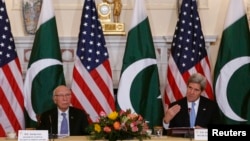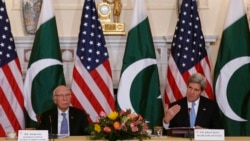The United States and Pakistan are committed to strengthening their relationship through the U.S.-Pakistan Strategic Dialogue. At the most recent meeting, U.S. Secretary of State John Kerry said, there are fundamental issues, including economic and security issues that both countries must unite around.
Since Pakistan’s historic election last May, Prime Minister Nawaz Sharif has set out to make Pakistan’s marketplace a tiger economy for the 21st century. To that end, both countries affirmed their commitment to expand bilateral trade and business links and welcomed the upcoming U.S.-Pakistan Trade and Investment Framework Agreement Council meeting in March 2014.
On the energy front, the United States has already helped add 1000 megawatts of capacity to Pakistan’s grid since 2009. Additional areas for collaboration include improving electricity distribution and reforms that will attract greater private investment.
The U.S. has partnered with Pakistan to make significant investments in traditional infrastructure, including the construction of 900 kilometers of roadways in regions that border Afghanistan, including the four main trade routes between the two countries. The U.S. and Pakistan continue to have a shared, strategic interest in a Pakistan that is at the center of an economically diverse region and a dynamic South Asian marketplace.
A critical component to furthering Pakistan’s prosperity is education. That’s why the U.S. invests more in its Fulbright program in Pakistan than anywhere else in the world. The U.S. has also built and renovated over 600 schools in Pakistan and provided 12,000 students with scholarships to attend local universities.
Terrorism continues to threaten Pakistan and its efforts to develop. That is why it remains essential for the United States and Pakistan to continue to find avenues of cooperation on counterterrorism and on nuclear security. Pakistan is a critical partner in securing Afghanistan, and it is clear that Pakistan’s own security is linked to Afghanistan’s success. That’s why the threat of cross border militancy needs to be addressed.
The United States and Pakistan remain committed to advancing their strong partnership through the Strategic Dialogue and recognize the importance of a U.S. Pakistan partnership built on mutual interest and respect.
Since Pakistan’s historic election last May, Prime Minister Nawaz Sharif has set out to make Pakistan’s marketplace a tiger economy for the 21st century. To that end, both countries affirmed their commitment to expand bilateral trade and business links and welcomed the upcoming U.S.-Pakistan Trade and Investment Framework Agreement Council meeting in March 2014.
On the energy front, the United States has already helped add 1000 megawatts of capacity to Pakistan’s grid since 2009. Additional areas for collaboration include improving electricity distribution and reforms that will attract greater private investment.
The U.S. has partnered with Pakistan to make significant investments in traditional infrastructure, including the construction of 900 kilometers of roadways in regions that border Afghanistan, including the four main trade routes between the two countries. The U.S. and Pakistan continue to have a shared, strategic interest in a Pakistan that is at the center of an economically diverse region and a dynamic South Asian marketplace.
A critical component to furthering Pakistan’s prosperity is education. That’s why the U.S. invests more in its Fulbright program in Pakistan than anywhere else in the world. The U.S. has also built and renovated over 600 schools in Pakistan and provided 12,000 students with scholarships to attend local universities.
Terrorism continues to threaten Pakistan and its efforts to develop. That is why it remains essential for the United States and Pakistan to continue to find avenues of cooperation on counterterrorism and on nuclear security. Pakistan is a critical partner in securing Afghanistan, and it is clear that Pakistan’s own security is linked to Afghanistan’s success. That’s why the threat of cross border militancy needs to be addressed.
The United States and Pakistan remain committed to advancing their strong partnership through the Strategic Dialogue and recognize the importance of a U.S. Pakistan partnership built on mutual interest and respect.






